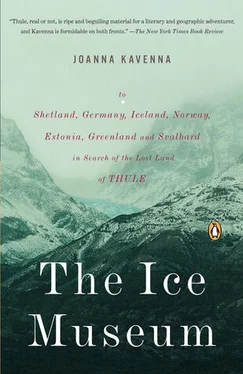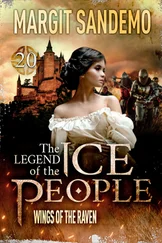As the Germans fell silent at dinner, as the hours moved slowly onwards, I imagined we were sneaking past a white-bellied mythical creature, snoring in the distance. Sneaking towards the last frontier, US Air Base Thule. Perhaps it was the remorseless stillness of the land or the endless emptiness of the coasts, but as the occasional settlements became increasingly strange, I began to create a wild fantasy about the voyage. It had a plot like low-budget sci-fi: a secret struggle against an indeterminate threat, set against a studio backdrop of hostile plains of ice, the white paint still drying on the set. I had a thumbnail summary: radio signals from Thule Air Base stop; someone is summoned to the scene to see what has happened; they find atavistic carnage, a few survivors hiding out in their barracks refusing to come out. Somewhere like Kurtz’s camp, relocated to 76° N. A fragile collection of people, presided over by a man who has lost his mind, taking on the amoral power of the wilderness. The crazy governor of Thule would be sitting in his metal shack, tended by a few soldiers in ragged uniforms. A white storm would sweep across the base, obscuring everything. Conversations would be in desperate crescendo, screamed above the wind.
There was a violent storm, and everyone fumbled along the corridors, vanishing at intervals to be sick. Everything slid off the tables; people wheezed in the dank below-decks air; waves splashed onto the decks. Later the water froze, making the decks like a skating rink. We moved onwards through a twilight sea, the coast hazy under the night mist. White-flecked waves were crashing onto the black rocks, ice shone on the mountains. The rocks were low above the water, coloured grey and green. The bergs were sometimes fifty metres high, with intricate carvings on their sides. Mountains loomed above the bow of the boat, icebergs drifted along the coast. The whiteness of the sky merged with the pallor of the sea. The season was dwindling towards winter, but the boat still ploughed through the ocean.
There was a murmur of dissent; no one wanted to leave the ship. The captain was bright and optimistic. ‘Welcome!’ he was saying. ‘Welcome to the lovely town of Kulloorrdddsssaaaussag—well, whatever it’s called, it’s a lovely town! I love this town!’ He sat on the bridge, watching the mists swirl around the mountains, with his feet up on the maps.
I joined a party of two, the adulterous biologists, leaving their spouses at the bar. The Inuit children had come to the harbour to watch us arrive; we were so far north that a ship was a major event. The children laughed on the quayside, staring at the arrivals. I could see a few passengers looking through their portholes on the ship, before vanishing back into their cabins.
The shore was covered with debris, the port a piece of wood surrounded by rusting containers. A dead dog was decaying slowly to the left of a pile of boxes. Litter, broken bottles, a few piles of seal innards. The paths were muddy. It was ten in the morning when the ship docked, and the houses were shut up and quiet. A few children moved between the painted houses; the dogs lay with their heads in their fur, as the sunshine spread across the shore. The vast rock pile behind the settlement, rubble rising into a mountain, was coloured a brilliant red, beautiful in the sunlight, and from the first level of the pile there was a view on all sides of silver waves and icebergs. Clouds hung above the mountains, ice covered the peaks, falling into the troughs and crevasses, dwindling across the slopes.
There was a smiling Greenlander coming down the path and because the biologists had vanished behind a pile of rubble he came up to me, his hand outstretched. He spoke a fractured Danish; he told me he was called Lars. Struggling to phrase the question, as I struggled to understand, he asked me to his hut for coffee and wine. His wife, Anna, had baked a cake, he said. I followed him along a path stained with grease and blood. He was small, wearing black trousers, a blue shirt; he was sixty-four, he told me, though he looked a decade or two younger. His house was a wooden shack, painted blue. Lars’s neighbours had killed a seal the day before. Its guts lay on his porch, arranged on a plastic sheet, glistening. Lars stepped neatly over the guts, opened the door into a pile of chaos, a house made of scraps, wood hammered roughly into tables piled with dirty plates and coffee cups. He was a hunter, he said, but the season had not been so good. He lived for much of the year by fishing, but he shot seals when he could, and in September the polar bear season began. He showed me his fishing log; he hadn’t caught a thing for months. Anna brought out the cake, the coffee and the cups. The kitchen was full of antiquated appliances—1970s plastic mixing bowls, coffee pots, rusty old pans—and the walls were covered in certificates and pictures, gaudy images of Christ, photographs of their children. There were no books, but there was a large TV and a video recorder, incongruous in the patched-up room.
‘This,’ said Lars, holding up a piece of paper, ‘is my certificate, when I came second in the national dog-racing trials.
‘I have seven children, four sons and three daughters. I had another son, but he died last year, on the ice. Here,’ said Lars, handing me a large picture of his son in a shroud, which stood on the cupboard.
‘This is Greenlandic cake,’ he said, handing me a slice of stale fruitcake.
‘I have two boats, small boats. I never go to Nuuk,’ he said, smiling. ‘It is too far away. I have heard it is a great city.’
A great city of thirteen thousand people, spilling its metropolitan vastness into the fjord.
‘But my brother lives there. He married a Danish woman. I have not seen him for twenty years.
‘My son,’ Lars said, ‘caught two narwhals. That is a wonderful thing. You can become rich, even from one narwhal, because everyone wants to buy the narwhal horn.’
He smiled. Anna smiled. He had built his house with his own hands, he said, then later he said the Danish government had given it to him, as a present. Lars wanted me to stay for the day; it was pure kindness. We could hardly understand each other, but he kept bringing out pictures and cakes while Anna smiled.
‘Come again, come again soon,’ Lars was saying, as I thanked them and stepped out onto the porch.
It was hard to get a true sense of Lars and Anna. It was hard to get a true sense of anything in the ice island, because of the blankness that surrounded everything. The endless whiteness of the ice drained the spectrum, dominating everything. It wasn’t just the people who were bleached; it was the objects too. The objects were fainting into pallor. I scrambled up icy rocks, to the peak of a small rubble mountain above the town. I avoided a large hole which had been dug as a rubbish pit, and was already almost filled with bright plastic bags. Then I nearly fell into a narrow ravine, like a gash in the mountain. There were water pipes banged into the rocks in a long line, running up the mountain, and the mountain was like the wreckage of an avalanche. Moss clung to the slopes; there were white birds nesting at the top, and cracked eggs scattered further down the mountainside. Beyond the ridge I could see to the foot of a glacier, the bergs around its base crushed together, forming a mass of ice and snow on the sea.
One evening as I was lying flat on the deck of the ship, I heard voices approaching, and there were the captain and a Philippine sailor walking along the deck. I laid my head on my arm again and lost myself in a doze, though the wind was whipping across the deck and the night was cold. Then I heard the captain saying: ‘I don’t like us going this far north. Am I the captain or not? The season is changing, the ice gets thicker. We should turn back. They’ve said we can’t even go to Thule Air Base. Permission denied. So why are we going on? Look at this weather,’ he said, as the wind blustered and the ship heeled, ‘I’ve seen worse, but this is a small ship, you feel everything.’
Читать дальше












